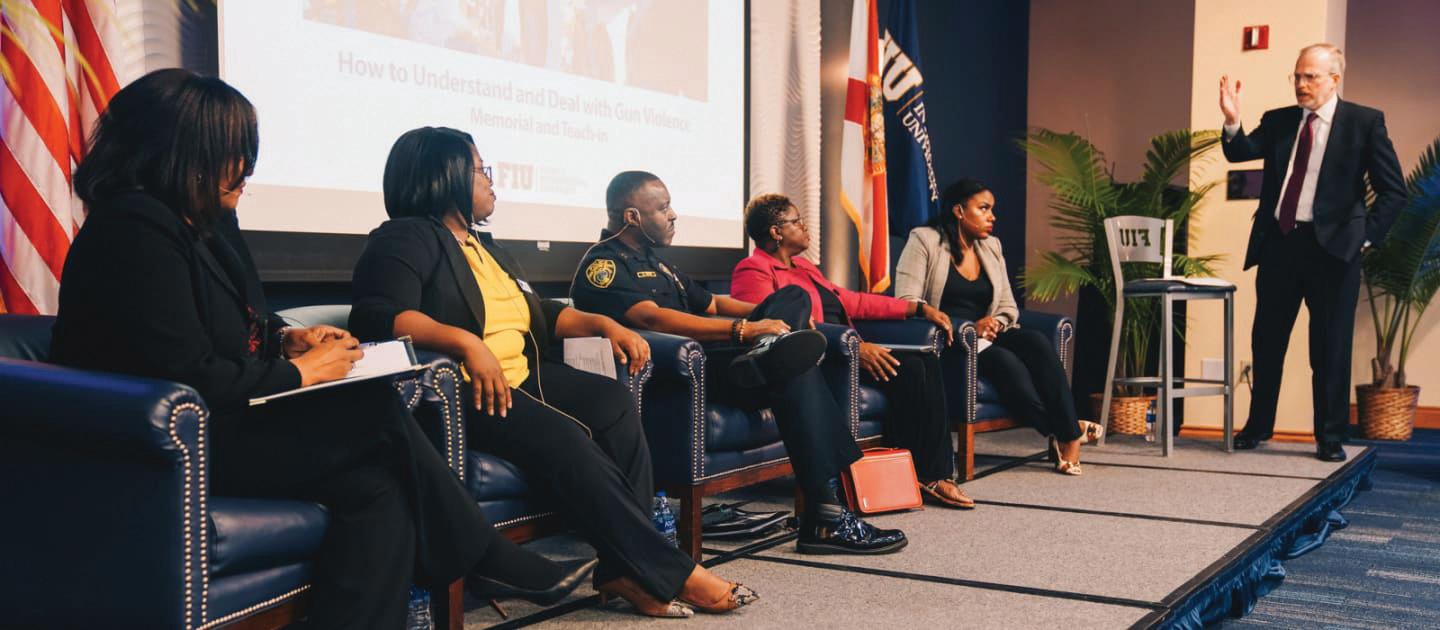
7 minute read
Gun Violence
Students, faculty gather to remember gun violence victims
It’s become an all too familiar refrain on newscasts and in social media posts. “Thoughts and prayers” for the growing number of gun violence victims in communities across the country. Shootings dominate news headlines for a few days, only to be overshadowed by new acts of violence. The FIU community came together once again to mourn, to remember and to honor those affected by gun violence. Hosted by the Green School, the event was also a teach-in for the FIU community: an in-depth conversation with experts in criminal justice, law, psychology and law enforcement on how to cope with the tragedies, deal with the aftermath and work toward solutions.
“We must never become numb and inured to this awful reality that claims innocent lives
and destroys families,’’ said Green School Senior Fellow David Kramer, who moderated the discussion. “How can we make ourselves safer, reduce the likelihood of more mass shootings and reduce gun violence more broadly, while also protecting individual rights?” Back-to-back shootings in El Paso, Texas, and Dayton, Ohio, took 31 lives in less than 24 hours, leaving the nation stunned and shaken, said President Mark B. Rosenberg. However, sadness and grief can and should be turned into action, he said. “I call upon you today to take what you learn here and use it … use it to make our communities better, to make our nation better. Let our sadness drive us to do more and to once again embrace the bright weapons of love and hope and action.” “We are not powerless,’’ Rosenberg added. “Our will to be better can be translated into action … to ensure that our communities become beacons of peace and prosperity. It starts with what we’re doing here.” While incidents with mass casualties like those
in Parkland, Dayton and El Paso get the biggest
headlines, gun violence is a much broader issue than many people realize. “People tend to hear more about mass shootings, but it’s the everyday violence in our urban communities that is much more prevalent,’’ said Candice Ammons-Blanfort, instructor in the Department of Criminology and Criminal Justice and the first graduate of FIU’s Ph.D. program in international crime and justice. While funding for critical mental health services is not sufficient, it’s important not to use mental illness “as a scapegoat’’ for gun violence, added Carleen Vincent, senior instructor and associate chair of the Department of Criminology and Criminal Justice. People with mental illness, she said, are far more likely to become the victims of violence than to commit acts of violence.
Green School hosts second annual lunch for Consular Corps of Miami
The Green School hosted an honorary lunch for the Consular Corps of Miami in recognition of the group’s integral role in advancing diplomacy in the South Florida region. Dean John F. Stack Jr. opened the event by acknowledging the destruction and lives lost after Hurricane Dorian struck the Bahamas on August 24. Terry Archer, consul to the Bahamas, expressed his gratitude for the outpouring of support for those affected by the storm. Also attending were Consular Corps Secretary Nabil J. Achkar, Ambassador Volker Anding of Germany and Acting Dean of the Consular Corps of Miami, María Mérida de Mora of Guatemala. Assistant Professor Eric Lob of the Department of Politics & International Relations gave the keynote address at the event, focused on the current state of U.S.-Iran relations and tensions that have developed between the two countries. In October 2019, the Program in the Study of Spirituality revisited the legacy of writer and mythologist Joseph Campbell in an event featuring Robert Walter, the president and executive director of the Joseph Campbell Foundation. Walter shed light on key questions about the power of myth, how a story can influence the lives of millions and how we celebrate our common journey as one human family. Campbell is best known for his work in comparative mythology and comparative religion. In his acclaimed The

FIU President and Green School Dean travel to China for graduation
In May 2019, FIU President Mark B. Rosenberg and Green School Dean John F. Stack traveled to Qingdao, China to celebrate the second commencement ceremony of the dual degree program in Spanish. Pascale Becel, chair of the Department of Modern Languages, was grand marshall for the ceremony. The dual degree program in Spanish is a partnership between FIU and Qingdao University and is administered by the Department of Modern Languages. One of its goals is to help bring together two powerful regions and break the language barrier between China and Latin America. “We live in a time of tremendous change,” said Rosenberg at the ceremony. “We also live in a time where we’re more globally connected to one another than before. The partnership between QU and FIU – and this program in particular – are key to strengthening and forming business connections to ensure economic well-being for
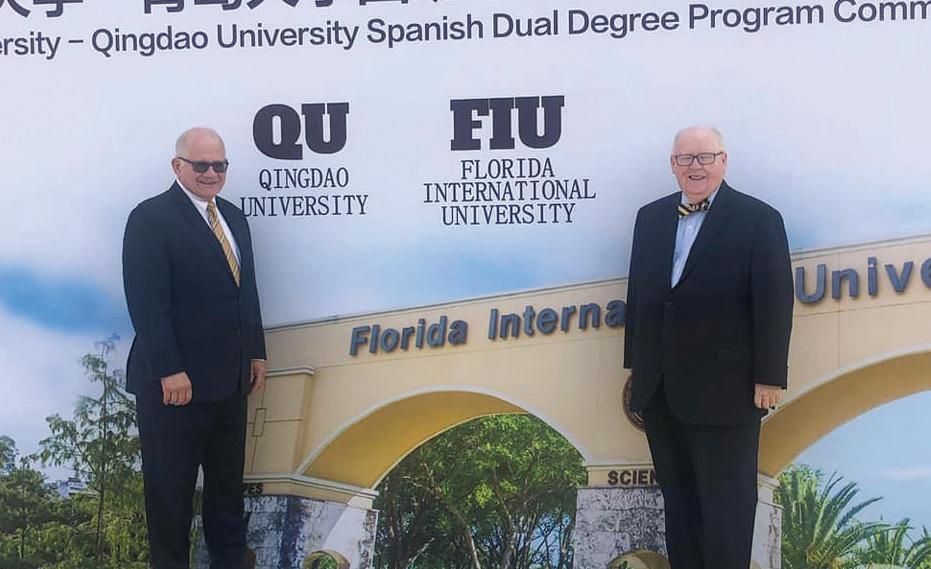
The Hero with a Thousand Faces – revisiting the legacy of Joseph Campbell
years to come.” Hero with a Thousand Faces (1949), Campbell argued that universal patterns are the essence of – and common to – heroic tales in every culture. This groundbreaking work has sold almost two million copies and has been translated into dozens of languages. It has influenced generations of creative artists, including songwriters, authors and filmmakers such as George Lucas in the Star Wars series.
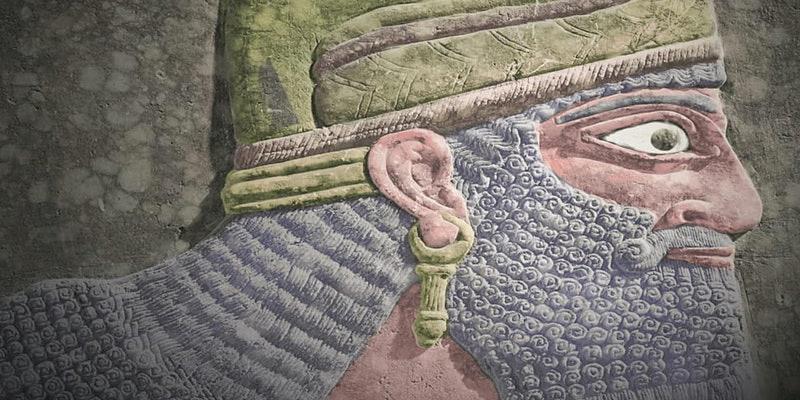
The event was co-sponsored by the Department of Religious Studies, The Humanities Edge and Coral Gables Congregational-United Church of Christ.
The world through Haitian eyes:
History professor presents new co-edited book
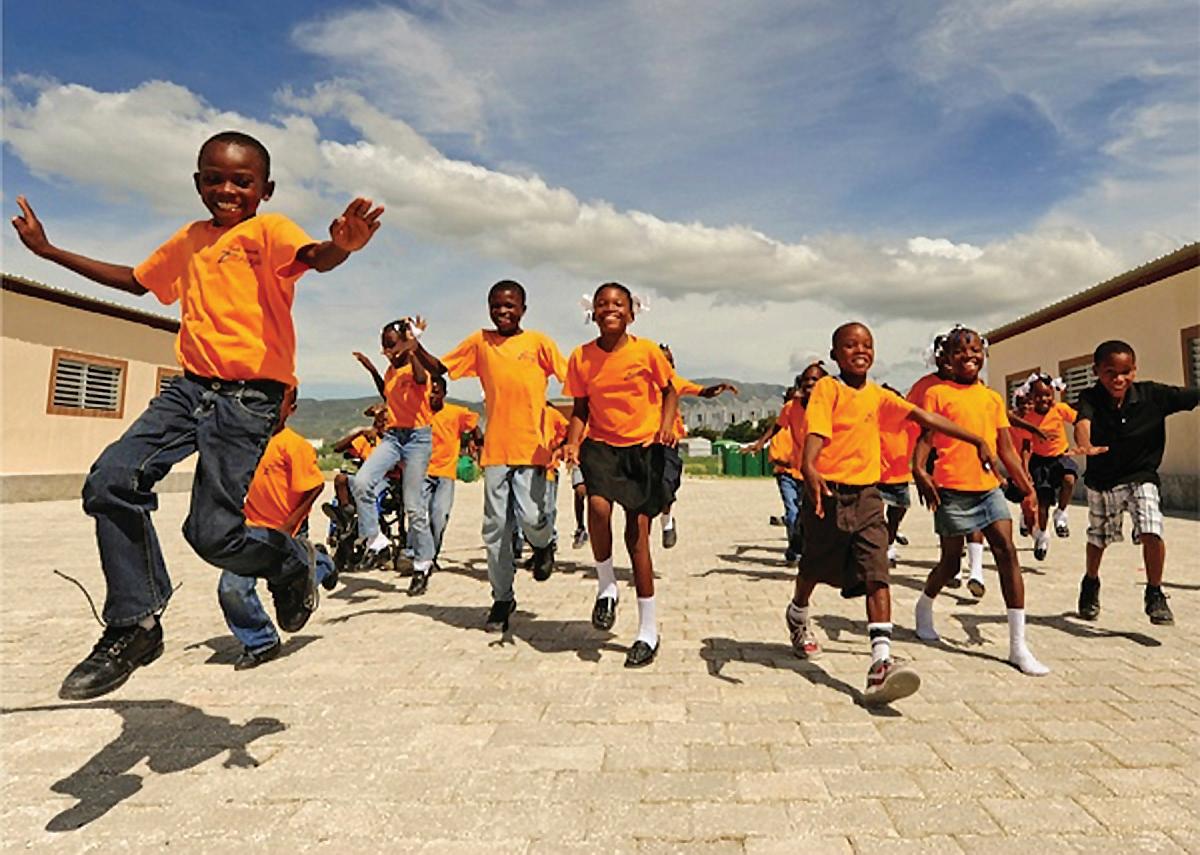
Chantalle Verna, FIU associate professor of history and international relations, recently presented her co-edited work, The Haiti Reader at Books & Books. She was joined by co-editors Laurent Dubois, professor of romance studies and history at Duke University, and Kaiama Glover, professor of French & Africana studies at Columbia University. The Haiti Reader introduces readers to Haiti’s dynamic history and culture from the viewpoint of Haitians from all walks of life. Its dozens of selections—most of which appear here in English for the first time—are representative of Haiti’s scholarly, literary, religious, visual, musical, political cultures, range from poems, novels, political tracts to essays, legislation, songs, and folk tales. Verna is also the author of Haiti and the Uses of America: Post-U.S. Occupation Promises (Rutgers University Press, 2017). Her current projects include research on Haitian professionals hired to work across Africa during the waves of decolonization that followed the Second World War, and a collaborative scholarly edition and translation of St. Victor Jean-Baptiste’s Fondateur Devant l’Histoire (1954).
In 2019, the Green School’s Jain Studies Program hosted two major events – one about Jainism and crime prevention and one about causality in Jaina philosophies – which served as the Seventh Mahavir Nirvan Lecture and the Ninth Annual Mahavir Jayanti Lecture. Suman Kakar, a professor in the Department of Criminology and Criminal Justice, explored how Jain principles could be applied to crime prevention – particularly violent crimes. Kakar, who has earned multiple university awards in research, teaching and service and has been nominated for the University Distinguished Professor Award, explored the implications Jain doctrines can have on society and how they can serve as guideposts for the creation of public policies to reduce and prevent crime. At the second event, the Jain Studies Program hosted Ana Bajželj, an associate professor in religious studies at the University of California, Riverside. Her presentation, titled “Clay Pots, Golden Bracelets and Clean Upper Garments: Causality in Jaina Philosophy,” focused on how new things come into being – a question that sparked some of the most important debates among Indian philosophers and religious seekers.
Experts discuss democracy in central Europe
Eighty years since the German invasion of Poland and 30 years since the fall of the Berlin Wall, the European and Eurasian Studies Program at FIU, in collaboration with The American Institute of Polish Culture and The Honorary Consulate of the Republic of Poland, held a conference on Democracy in Central Europe as part of the Lady Blanka Rosenstiel Lecture Series.
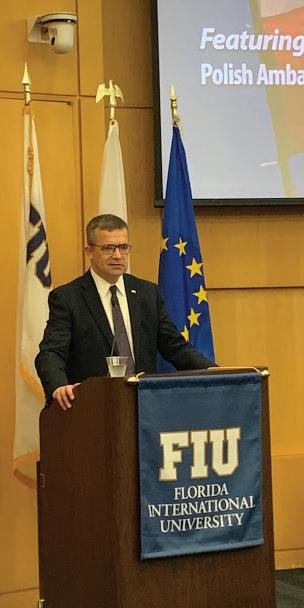
Authorities of the Honorary Consulate of the Republic of Poland and FIU experts from diverse fields engaged in this discussion and provided their perspectives on the past and present of democracy in that region.
Polish Ambassador H.E. Piotr Wilczek spoke at a conference on democracy in Central Europe in October.
Dean John Stack and David Kramer, director of the European & Eurasian Studies Program, opened the conference. Speakers included Polish Ambassador to the U.S., His Excellency Piotr Wilczek, who delivered opening remarks.










